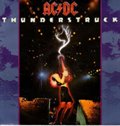Up until December 2013 when an internet campaign was launched to get them to number one for Christmas, AC/DC held the record for the most UK hit singles without making the top 10. The campaign failed to get them to the top, but a mass of downloads allowed Highway to Hell to reach number four giving them their biggest UK hit. This week I tell the story of their first hit of the 1990s, Thunderstruck.
AC/DC were formed in Sydney, Australia by the Young brothers, Malcolm and Angus. Their original lead singer was Dave Evans who was replaced within a year by Bon Scott. By the time of their debut album, High Voltage, in 1975 the remainder of the line-up comprised Mark Evans on bass, and Phil Rudd on drums. In 1977 Evans was replaced by Cliff Williams who continued until 2016. Following the tragic early death of Bon Scott in 1980, aged just 33, the band were going to call it a day, but then reconsidered when they figured Scott would have wanted them to carry on and began looking fora new lead singer. A few were considered including Noddy Holder who declined because he had further plans for Slade and so Brian Johnson, the former lead singer with Geordie got the job and led the way until 2016 when former Guns N’ Roses vocalist Axl Rose replaced him. Angus’ gimmick was always to be in school uniform and even at the age of 62 he doesn’t look too out of place.
Many fans consider their early material the best, but Brian did a great job, they had top 20 hits in the eighties with Rock ‘N’ Roll Ain’t Noise Pollution, Let’s Get It Up, For Those About To Rock (We Salute You), Who Made Who and Heatseeker. Their first hit of the nineties was also their biggest – discounting the aforementioned Highway to Hell – Thunderstruck got to number 13 in 1990.
The tune came about by accident really as Angus described in the sleeve notes of the parent album Powerage, “It started off from a little trick that I had on guitar. I played it to Mal and he said, ‘Oh I’ve got a good rhythm idea that will sit well in the back.’ We built the song up from that. We fiddled about with it for a few months before everything fell into place.” Angus Young explained in The Story of AC/DC: Let There Be Rock, “I created the distinctive opening guitar part by playing with all the strings taped up, except the B. It was a studio trick I learned from my older brother George Young, who produced some of AC/DC’s albums and was in a band called The Easybeats. Lyrically, it was really just a case of finding a good title. We came up with this thunder thing and it seemed to have a good ring to it. AC/DC = Power. That’s the basic idea.”
They continued to released singles and albums throughout the nineties including Ballbreaker and in the 2000s with Stiff Upper Lip and Black Ice which, in 2008, gave them their second chart-topping album, 28 years after their first. To accompany the latter they set out of a 20-month world tour which took in 168 shows. During that tour some shows had to be rescheduled due to Brian Johnson receiving treatment for ulcers. The album was released worldwide but in the US it was only sold exclusively at Walmart, Sam’s Club and the band’s official website.
In 1988 they were inducted into the Australian Recording Industry Association’s Hall of Fame and 15 years later into the Rock and Roll Hall of Fame.
In April 2014, Malcolm announced, via the AC/DC Facebook page, that he will be retiring from the band due to ill health but would be replaced in the studio by his nephew Stevie. Sadly Malcolm died in November 2017, just one month after his older brother George who, as mentioned earlier, produced much of the band’s early material.
Their sales figures are astronomical, by 2007, their 1980 album Back in Black had sold 22 million in the US alone which made it the fifth-best-selling album of all-time over there. Their total record sales exceed 72 million and are currently the fifth best-selling band of all time.
Thunderstruck was featured in the 1999 film Varsity Blues for which they charged a mammoth $500,000 for its use. The film’s music supervisor, Thomas Golubic, said at the time, “I remember being absolutely horrified when I heard that number, we spent a lot of time coming up with what we thought were great alternates, but there was going to be no budget on that, and they had money so they paid for it.”
